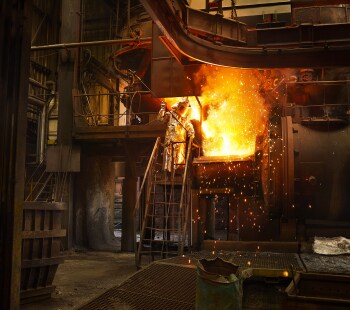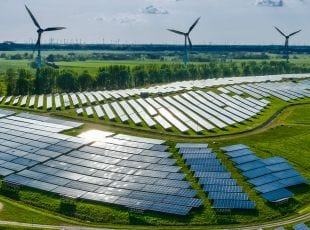What is your role within BNP Paribas’ French Commercial Banking and what type of companies do you target?
Dorothée Julliand: Sustainable finance is one of the key themes of French Commercial Banking's 2025 strategic plan for corporate customers. Our team works within the management structure of the France Entreprises network which comprises 39 business centres dedicated to a customer base of SMEs, intermediate-sized enterprises and major companies nationwide.
More and more companies are integrating CSR issues into their development strategy. Against this backdrop, our role is to respond to their needs and assist them in their sustainability strategy. We have therefore set up advisory and financing support for their investment projects.
Our business managers and sustainable finance experts are on hand to help them with the 3 pillars of their CSR approach:
- build and evaluate their CSR strategy;
- finance their projects, particularly those linked to their energy and environmental transition;
- help improve their social and societal impact.
Our business as a bank fully integrates these new challenges: identifying and understanding our clients' transition strategy and all the risks and opportunities related to environmental and social issues that impact their business models is becoming a key component of our analysis.
<< Dorothée JULLIAND, Head of the Sustainable Finance Offer and Business Development for Corporate Clients
What are the main offers proposed to companies to support their sustainable transformation?
Dorothée Julliand: To support our customers in their CSR initiatives, we have developed a comprehensive range of advisory and financing services, based on the BNP Paribas integrated model with our branches, but also with our selected partners as part of our beyond-banking offering.
The sustainable financing offers from the French Commercial Banking are divided into two main families:
- Loans to finance investments, assets or projects that directly contribute to the environmental transition (such as the “Crédit Green” offer),
- Loans to finance any type of corporate investment, incorporating ESG criteria with improvement targets for the company. These are the “sustainability linked loans” or SLLs, as well as our “Impact” and “Décarbonation” financing which we will describe in detail. Our team also works to structure SLLs, which are really picking up the pace in the private debt market. We then work with our structured finance teams to define the relevant ESG criteria and their evolution with the client.
The "Financement à impact" (Impact Financing) product
Launched in January 2022, this was the first “packaged” product with ESG criteria in our sustainable finance offering, specifically dedicated to SMEs and intermediate-sized enterprises. “Financement à Impact” is a traditional medium-term financing product, available for any type of investment, with fixed or variable interest rates, and includes an extra-financial assessment provided by our partner EcoVadis. The interest rate is reduced if the company meets the annual growth targets set at the time the loan was granted.
The decarbonization process is essential for our entire economy
The "Financement Décarbonation" product
In May 2024, we completed our range of offers with “Financement Décarbonation”. This new sustainable loan is aimed at SMEs, intermediate-sized enterprises and associations, that wish to embark on a path to reduce their greenhouse gas (GHG) emissions. The principle is simple: a loan whose interest rate is adjusted according to the reduction of the company's greenhouse gas emissions. We will therefore pay special attention to the carbon footprint produced by the client. The amount starts at €1 million for a period of 2 to 7 years.
What projets can be funded with "Financement Décarbonation"?
Dorothée Julliand: As with “Financement à Impact”, all projects are eligible for “Financement Décarbonation”, apart from investments that could undermine any of the EU’s six climate and environmental objectives. For example, we can finance external growth as well as development work.
“With the launch of “Financement Décarbonation”, we will continue to encourage and support our clients' ESG initiatives, in particular their greenhouse gas (GHG) emissions reduction path.”
Why is the carbon footprint such an important aspect of business stratgies?
Dorothée Julliand: It’s worth recalling the regulatory context: since January 2024, an EU directive (CSRD/ Corporate Sustainability Reporting Directive) has been gradually requiring companies to communicate their ESG data, including their GHG assessment. The companies concerned must assess the sustainability risks they face, as well as their impact on society and their environment.
But beyond regulation, it is important for all companies, regardless of size, to measure their carbon footprint. This is data that is becoming increasingly important to their customers and is being asked for more and more in tenders, for example. This is why we have already established partnerships with specialist players that we have been recommending to our clients for 2 years.
As part of our "Financement Décarbonation" product, we ask the company to carry out a GHG assessment covering 3 scopes* and commit to a reduction path defined by us. There are two carbon footprint methodologies to measure GHG emissions:
- French methodology of the ADEME (French Agency for Ecological Transition)
- GHG Protocol, the international reference. This is the one that will be applied by our clients within the framework of the afore-mentioned CSRD.
La Fonte Ardennaise
La Fonte Ardennaise, a french family business founded in 1927 and Europe's leading independent subcontracting foundry, has embarked on a decarbonisation process. It is supported by BNP Paribas in the acquisition of an innovative sand regeneration tool that will also enable it to meet its circular economy commitments.
What are the conditions required to benefit from the “Financement Décarbonation” credit?
Dorothée Julliand: Companies that sign up for a “Financement Décarbonation” commit to sending us their certified carbon footprint each year. We offer our clients the opportunity to commit to a reduction path of 4.6% per year based on the reference year.
- Why this 4.6% rate?
Dorothée Julliand: It was not chosen by chance! We have established the path, which applies to the 3 scopes, with our internal experts, based on international benchmarks (such as that of the SBTi -Science Based Target Initiative) and the European Union’s carbon neutrality targets for 2050. Our aim is to make this path acceptable to SMEs and intermediate-sized companies, while remaining ambitious! As with "Financement à Impact", if the target is met, there is a bonus with a 0.10% reduction in the initial interest rate the following year. Our approach is incentive-based and if the target is not met, there is no penalty: the initial rate is maintained the following year. However, for companies that do not respect their commitment to transmit their annual carbon footprint, a penalty of 5 basis points will be applied on the anniversary date.
Trecobat
The Trecobat industrial group is to increase the production capacity of its timber frame wall factory in order to reduce the carbon footprint of its housebuilding operations.
“Financement à Impact” and “Financement Décarbonation”, which product to choose?
Based on the improvement of an extra-financial criterion: GHG emissions for "Financement Décarbonation", the EcoVadis rating for "Financement à Impact", the operation of the 2 solutions is identical, but with different eligibility thresholds. Our goal is to give our clients a choice, so they can select the ESG indicator, and therefore the product that suits them best. For our clients whose CSR approach is more mature, for example, those who have already achieved a high EcoVadis rating, improving this rating will be increasingly difficult and have less impact; their maturity also means that many of them have already established their carbon footprint, which is why we guide them towards “Financement Décarbonation”.
To conclude, by signing up to “Financement” Décarbonation, our clients commit themselves to quantified and concrete targets and thus promote their decarbonisation strategy to their customers, suppliers, partners and employees, while benefiting from a preferential rate.
*GHG assessment: definition and scopes
The Greenhouse Gas assessment includes 3 categories of emissions, classified according to type:
- Scope 1: emissions directly linked to operations
- Scope 2: indirect emissions linked to energy (electricity production in particular)
- Scope 3: all other indirect emissions linked to other processes upstream or downstream of operations
To contribute to carbon neutrality, a 3-step action plan is needed
Measure - Reduce - Contribute
To meet their CSR commitments but also for economic reasons, many companies must decarbonize their value chain. Unlike Scope 1 and Scope 2 emissions, Scope 3 emissions are more difficult to identify, measure, control and therefore reduce.
To establish their carbon footprint, our corporate clients can rely on our partners such as Greenly (SME), Climate Seed (SMEs, intermediate-sized enterprises) and Sweep (intermediate-sized enterprises, major companies)
- EcoVadis: our partner, a specialist in extra-financial ratings, offers SaaS CSR assessment solutions for all companies, regardless of their sector of activity.
With EcoVadis, evaluate your CSR performance











